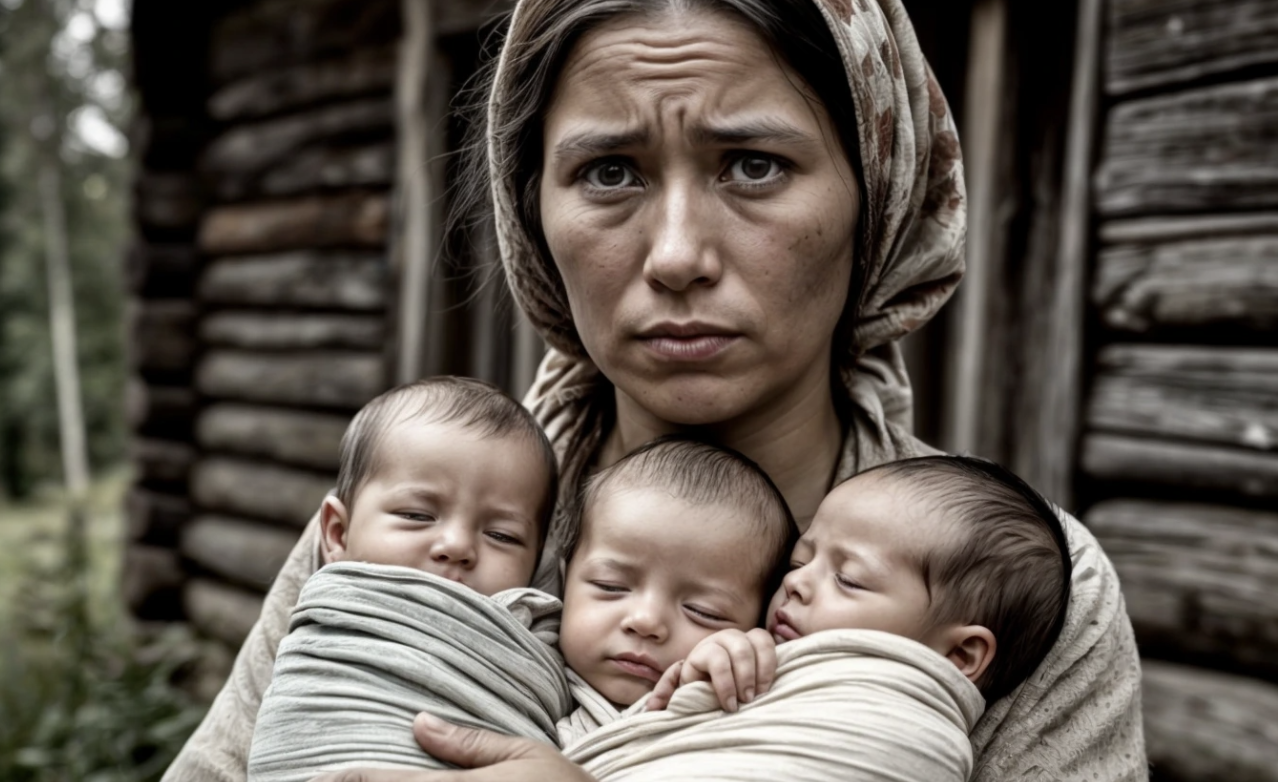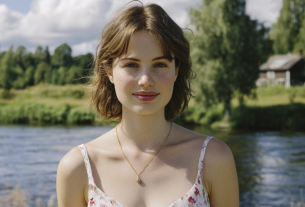The Girl from the Riverbank
Anna never aspired to anything special. She didn’t dream of great achievements or a bright life beyond the village. She was born at the dawn of a quiet morning, in a house that smelled of stove smoke, homemade baking, and earth after the rain. Her parents were simple people: her father — strong as an oak, working himself to exhaustion; her mother — gentle, with warmth in her eyes, always knowing what to say to embrace the soul with words.
Life in the village was monotonous but alive. From early morning — chickens, cows, running around the yard. The day passed between the garden beds, the well, and the old creaky washing machine. In the evening — tea with jam, sometimes songs by the guitar, but most often — silence full of thoughts and memories.
Anna grew up kind but not naive. She could listen, noticed small things, valued simplicity. Her eyes shone not with superficial joy but with some inner confidence. It seemed she knew that life is not only beauty but also work, patience, and love that comes when you are ready to accept it.
Her youth passed in playing with friends, first flowers from boys who followed like shadows, and silent looks toward the future. But Anna’s heart remained calm for a long time. No glance, no smile could disturb it.
And then one summer day, when the grass had not yet withered in the sun, and the air was filled with the scent of blooming bird cherry, he came to the village — Mikhail.
Tall, broad-shouldered, confident in every movement. They said he owned several market stalls in the city — vegetable stands, fruit pavilions. To the locals, he was almost a rich man. Women buzzed around him like bees over honey. He laughed, accepted compliments, but looked away. And once — at Anna.
“You’re different,” he told her one evening as they walked along the river path lit by the sunset. “With me, it’s easy. Calm. Like home.”
She blushed. Didn’t believe it at first. It seemed to her that such men were not for girls like her. A simple village girl, with dirt on her boots and calluses on her hands. But he came back again. And again. And then he asked for her hand in marriage.
The wedding was modest — in the local club, with a homemade cake decorated with marzipan, and dancing to music from a phone. Anna didn’t want grandeur. It was enough for her that there was someone beside her who chose her. She was happy.
A Wife Nobody Asked to Be Perfect
Anna tried to be a good wife. A real one. Every day started with the market, where she picked the freshest vegetables; every evening — a hot dinner on the table. She ironed shirts, washed clothes, cleaned, cooked. She hummed to herself while clearing the table. Sometimes she looked at Mikhail and thought, “How lucky I am.”
But… he was cold. Reserved. He didn’t say “I love you,” didn’t hold her hand, didn’t truly look into her eyes. Sometimes it seemed he didn’t notice her at all. But Anna didn’t despair. “Men are different. They don’t know how to show feelings. I have to endure. It will get better over time.”
And then one evening at dinner, he said:
“We should think about having children.”
Those words sounded like the beginning of something bigger. Anna’s heart fluttered. “So, he really wants a family. A real one.” Thoughts swirled: bedtime stories, the first step of a child, morning pancakes, hugs, laughter, a name that will sound like a melody.
For the first time, she felt truly happy.
Triple Hope
Life flowed steadily. The house was in order, the husband busy, money was enough. Anna waited. Dreamed. Revolved around her dream like a cat around a Christmas tree. Mikhail increasingly mentioned “children” in plural, and Anna began to hope: maybe very soon?
And then two lines on the test became brighter. Brighter than the sunset. Brighter than her smile. She cried — quietly, with happiness that couldn’t be held inside. She waited. They would be a family. Full. Real.
When the doctor said:
“You’re having triplets. Two boys and a girl,”
Anna was speechless for a moment.
“Three?.. Are you serious?”
She left the office as if in a fog. Sat on a bench near the hospital, put her hand on her belly and whispered:
“You’re mine. My three. Whatever happens, I won’t give you to anyone.”
Fear and Silence
Anna knew Mikhail. Knew his caution, calculation, fear of uncertainty. She feared his reaction. So she decided to wait. Until the pregnancy was too obvious, until he couldn’t change anything.
But time passed. Her belly grew fast — too fast. People started noticing. Anna tried to hold on, but fear awakened more and more in her soul. And Mikhail didn’t notice the changes. He came home late, brushed off conversations, said:
“I’m tired. We’ll talk tomorrow.”
But tomorrow never came.
One evening, she mustered courage. Sat next to him, poured him soup, and said:
“Misha… I went for an ultrasound.”
He didn’t even look up from his phone.
“Well? Everything okay?”
She gathered strength.
“We’re not having one child.”
“Twins?”
“Triplets. Two boys and a girl.”
He looked up. Stared as if he didn’t understand. Then stood, grabbed his keys:
“I have a meeting. We’ll talk later.”
The next morning Anna felt ill. Dizzy. Labor pains started suddenly. She clutched her belly, called an ambulance, packed a bag, and went to the maternity hospital.
Mikhail didn’t answer. His phone was unreachable.
Born Together
The birth was difficult. But the children were healthy. Three tiny bundles. Three hearts. Three lives.
Two days later — a call.
“Where the hell are you?!” he shouted. “You left without telling! I’m working, and you disappear like…”
“I’m at the hospital, Misha. I gave birth.”
Pause.
“You… what?”
When he arrived, he held a plastic bag with baby diapers. He saw the children — turned pale.
“Are these… all ours?”
She nodded.
He sat down. Was silent for a long time. Then said:
“Maybe… give one away? At least one. It’s economical.”
Anna didn’t understand at first that he was serious. Then she simply stood up, went to him, and said:
“Take your diapers and leave.”
He exploded. Yelled, accused her of naivety, said she had “set him up,” talked about money, even hinted the children might not be his. Slammed the door and left. Never came back.
Anna looked out the window. His bag lay on the windowsill. And nearby, in transparent cribs, her children slept. All three. Her happiness. Her fate.
She didn’t cry. Not that day, not the next morning, not even when discharged from the hospital. There was no time for tears — three infants in her arms, emptiness behind her. Mikhail disappeared. Phone silent. No apologies, no money. Only the echo of his words: “Maybe one — to the baby home…”
A Home Where You Are Expected
Anna dialed her mother’s number. Her voice trembled, but she held herself:
“Mom, I’m coming home… May I?”
Her father arrived in an old “Niva.” He came to his daughter, looked long at the three newborns. Then said:
“It’s okay. We’ll get through.”
The house was the same as before: old, with a stove, the smell of milk and earthen floor. But now it was warm. At night, dad got up to rock the grandchildren. Mom washed clothes, helped, warmed milk. And Anna, as soon as she recovered, got a job — packing vegetables at the farm. Daytime — short naps, evening — smiles to her children.
Mikhail didn’t call. Not after a week, not after a month. Didn’t ask how they were. Didn’t inquire about their names. Didn’t send a penny.
Anna finally decided — called him herself. His voice was tired and irritated.
“Are you kidding? I have enough problems. No alimony, no money for you.”
She was silent. Just exhaled.
That evening she sat on the porch. Mom sat next to her, handed her a mug of warm milk.
“My grandmother used to smear her face with a herbal mask during the war. It saved from burns and wrinkles. Then she even sold it at the market — enough for bread for the children.”
Anna smiled.
“You think I’ll open a beauty salon here?”
“Try it. Everything starts somewhere.”
And she tried.
From Herbs to Success
That very night, while the children slept, she took out a notebook and wrote down the recipe: chamomile, mint, St. John’s wort, a little honey, a spoon of oil, and — a secret ingredient her mother whispered as if it were magic.
She brewed it. Let it cool. Applied — to herself and her mother. In the morning, her skin was smooth as a child’s. She joked, but inside for the first time in a long while, she felt something like hope.
A week later she gave it to a friend to try. Then another. Demand grew, and Anna began bottling the mask and selling it at the local market. Then — created a page on social media. Slowly orders started coming in. More and more.
Soon she had to rent a small room in the district center. Renovated, put in a table, jars, packaging. Mom and dad helped. Money flowed. Anna registered a sole proprietorship, got certificates, began hiring women from the village. She didn’t just have a mask anymore — she had her own brand.
Three years passed. She had long divorced Mikhail and didn’t even file for alimony.
Now she had an apartment in the city, large, bright, with three children’s rooms. The children attended a good school, did swimming, drawing, and said “mom” with such love that everything inside stopped. She bought her parents a new house.
A Meeting That Changed Nothing
Once, at a business meeting, she saw Mikhail.
Aged, balding, in a cheap jacket, he stood in a corner flipping through papers. He saw her — and froze. She approached calmly, in a beautiful suit, with a straight back and confident gaze.
“Hi, Misha,” she said. “Didn’t expect to meet.”
He mumbled something about how glad he was to see her. He was embarrassed, fidgety.
“You said you couldn’t survive without me,” he suddenly recalled, awkwardly smiling. “And look at you now…”
Anna smiled.
“In the collective farm, as you remember, I didn’t rot. And I survived. And I raised three.”
Mikhail watched her go for a long time. Six months later, Andrey appeared in her life. A man who wasn’t afraid of diapers, who read books to the children and came to pick her up with a thermos of tea when she stayed late at work. He didn’t promise stars, didn’t build castles in the air — he just was there. Every day.
And one day Anna woke up, looked at her three sleeping children, at the man next to her — and understood: she was home. In her life. Real. Not perfect, but happy.



